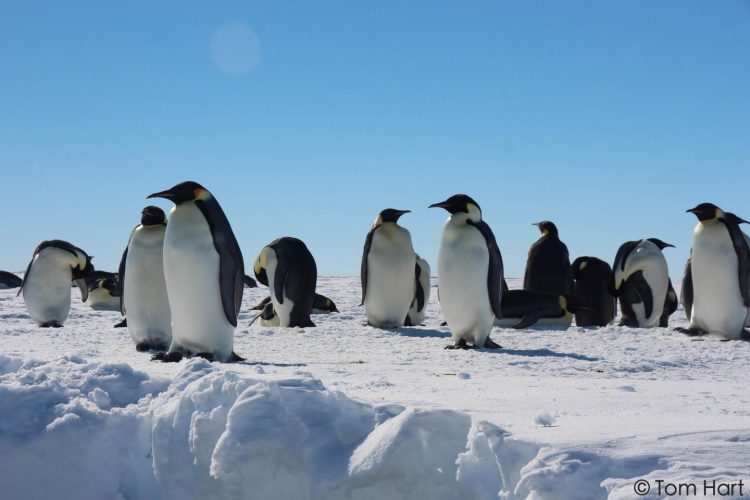Genetics reveals where emperor penguins survived the last ice age

A group of emperor penguins is resting and preening next to a tide crack in the ice near the Gould Bay colony. Credit: Dr Tom Hart
The Ross Sea is likely to have been a shelter for emperor penguins for thousands of years during the last ice age, when much of the rest of Antarctica was uninhabitable due to the amount of ice.
The findings, published today in the journal Global Change Biology, suggest that while current climate conditions may be optimal for emperor penguins, conditions in the past were too extreme for large populations to survive.
A team of researchers, led by scientists from the universities of Southampton, Oxford, Tasmania and the Australian Antarctic Division, and supported in Antarctica by Adventure Network International, examined the genetic diversity of modern and ancient emperor penguin populations in Antarctica to estimate how they had been changing over time.
The iconic species is famed for its adaptations to its icy world, breeding on sea ice during the Antarctic winter when temperatures regularly drop below -30 °C. However, the team discovered that conditions were probably too harsh for emperor penguins during the last ice age and that the population was roughly seven times smaller than today and split up into three refugial populations.
Gemma Clucas, a PhD student from Ocean and Earth Science at the University of Southampton and one of the lead authors of the paper, explained: “Due to there being about twice as much sea ice during the last ice age, the penguins were unable to breed in more than a few locations around Antarctica. The distances from the open ocean, where the penguins feed, to the stable sea ice, where they breed, was probably too far. The three populations that did manage to survive may have done so by breeding near to polynyas – areas of ocean that are kept free of sea ice by wind and currents.”
One of these polynyas that supported a population of emperor penguins throughout the last ice age was probably in the Ross Sea. The researchers found that emperor penguins that breed in the Ross Sea are genetically distinct from other emperor penguins around Antarctica.
Jane Younger, a PhD student from the Australian Institute for Marine and Antarctic Sciences and the other lead author of the paper, said: “Our research suggests that the populations became isolated during the last ice age, pointing to the fact that the Ross Sea could have been an important refuge for emperor penguins and possibly other species too.”
Climate change may affect the Ross Sea last out of all regions of Antarctica. Due to changes in wind patterns associated with climate change, the Ross Sea has in fact experienced increases rather than decreases in the extent of winter sea ice over the last few decades, although this pattern is predicted to reverse by the end of the century.
Dr Tom Hart from the University of Oxford and one of the organisers of this study added: “It is interesting that the Ross Sea emerges as a distinct population and a refuge for the species. It adds to the argument that the Ross Sea might need special protection.”
Media Contact
All latest news from the category: Life Sciences and Chemistry
Articles and reports from the Life Sciences and chemistry area deal with applied and basic research into modern biology, chemistry and human medicine.
Valuable information can be found on a range of life sciences fields including bacteriology, biochemistry, bionics, bioinformatics, biophysics, biotechnology, genetics, geobotany, human biology, marine biology, microbiology, molecular biology, cellular biology, zoology, bioinorganic chemistry, microchemistry and environmental chemistry.
Newest articles

Machine learning algorithm reveals long-theorized glass phase in crystal
Scientists have found evidence of an elusive, glassy phase of matter that emerges when a crystal’s perfect internal pattern is disrupted. X-ray technology and machine learning converge to shed light…

Mapping plant functional diversity from space
HKU ecologists revolutionize ecosystem monitoring with novel field-satellite integration. An international team of researchers, led by Professor Jin WU from the School of Biological Sciences at The University of Hong…

Inverters with constant full load capability
…enable an increase in the performance of electric drives. Overheating components significantly limit the performance of drivetrains in electric vehicles. Inverters in particular are subject to a high thermal load,…





















